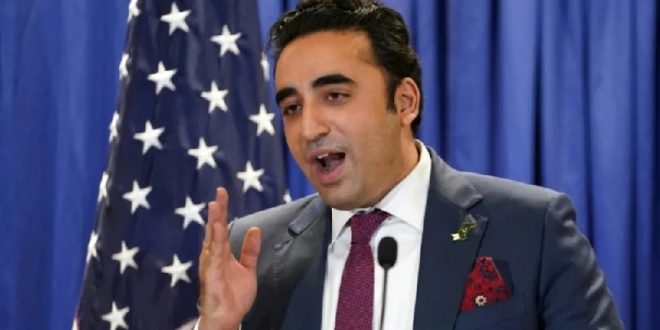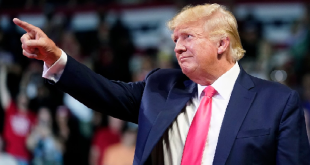29-09-2022
By SJA Jafri + AFP
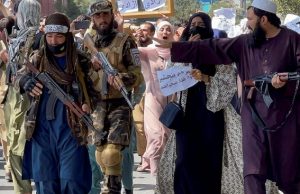 ISLAMABAD/ WASHINGTON/ KABUL: Pakistan’s foreign minister wants the world to engage with the Taliban, warning of dangerous consequences if Afghanistan’s rulers are again isolated.
ISLAMABAD/ WASHINGTON/ KABUL: Pakistan’s foreign minister wants the world to engage with the Taliban, warning of dangerous consequences if Afghanistan’s rulers are again isolated.
In an interview with AFP news agency on Tuesday during a visit to Washington, Bilawal Bhutto Zardari cautioned against creating “parallel governance” after the United States, distrustful of the Taliban, put Afghanistan’s frozen assets in a professional fund in Switzerland.
“We have learned from the past that when we wash our hands and turn our backs, we end up creating unintended consequences and more problems for ourselves,” Bhutto Zardari said.
“I believe that our concerns of an economic collapse, of an exodus of refugees, of a threat of new recruits for (armed) organisations … outweigh concerns that there may be about their financial institutions.”
Afghanistan has been reeling from a humanitarian crisis with more than half of the population facing hunger, amid Western-imposed sanctions, as well as the freezing of humanitarian aid and nearly $10bn in Afghan central bank assets.
The United Nations has said it is increasingly concerned that restrictions on girls’ education, as well as other 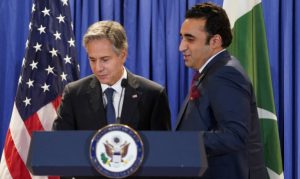 measures curtailing basic freedoms, would deepen Afghanistan’s economic crisis and lead to greater insecurity, poverty, and isolation.
measures curtailing basic freedoms, would deepen Afghanistan’s economic crisis and lead to greater insecurity, poverty, and isolation.
Bhutto Zardari said the Afghanistan rulers needed “political space” on concerns such as women’s rights, which have been sharply curtailed.
“Throughout history, theocratic, autocratic regimes haven’t exactly tended to expand rights at times of economic strife,” he added. “In fact, they tend to hold on to cultural issues and other issues to engage their population.”
Bhutto Zardari took office five months ago amid political turbulence in Pakistan after a no-confidence vote in former Prime Minister Imran Khan.
He also spoke to the Associated Press news agency in the final days of a trip to the UN General Assembly in New York where Islamabad has been trying to draw more world attention to the unprecedented floods that submerged one-third of the country, displacing millions of people.
Unrelenting monsoon rains that scientists say are worsened by climate change have killed more than 1,600 people in Pakistan, caused tens of billions of dollars in damage and destroyed much of the country’s staple food and commercial crops.
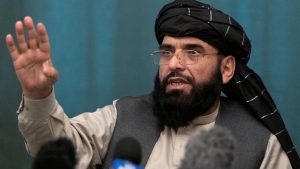 The roughly 30 million people in Pakistan reported to be displaced by the floods are “truly paying in the forms of their lives and their livelihoods for the industrialisation of other countries,” said Bhutto Zardari “and justice would be that we work together” globally, “that we’re not left alone, to deal with the consequences of this tragedy,” he said.
The roughly 30 million people in Pakistan reported to be displaced by the floods are “truly paying in the forms of their lives and their livelihoods for the industrialisation of other countries,” said Bhutto Zardari “and justice would be that we work together” globally, “that we’re not left alone, to deal with the consequences of this tragedy,” he said.
The Biden administration on Monday announced $10m in food aid for Pakistan on top of more than $56m in flood relief and humanitarian assistance this year.
Also on Monday, US Secretary of State Antony Blinken called on Islamabad to ask its close ally China to restructure debt accumulated as Beijing builds billions of dollars’ worth of infrastructure in a quest for Indian Ocean port access.
Asked about Blinken’s remarks, Bhutto Zardari said he has had “very productive conversations” with China and said he hoped that assistance after the historic floods “does not fall prey to great power rivalries and geostrategic issues”.
“I am sure the United States would like for us to comment more on China’s internal affairs,” Bhutto Zardari said “but maybe if we start by addressing disputes that are recognised by bodies such as the United Nations as disputes of an international nature that would be more productive.”
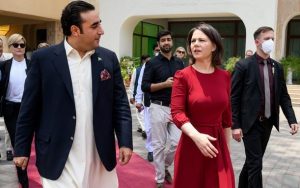 He was referring to Indian-administered Kashmir, the Himalayan territory divided between India and Pakistan and the trigger for two of their three full-fledged wars.
He was referring to Indian-administered Kashmir, the Himalayan territory divided between India and Pakistan and the trigger for two of their three full-fledged wars.
In 2019, Indian Prime Minister Narendra Modi stripped the region of its partial autonomy and opened the way for other Indian citizens to live there.
Bhutto Zardari said when his Pakistan People’s Party was in power in 2010, it moved to open trade with India, then led by Prime Minister Manmohan Singh.
“We were willing to take the political risk, stick our necks on the line, and touch the third rail of Pakistani politics, but because we knew that there was a rational, reasonable player on the other end who would perhaps be willing to reciprocate,” Bhutto Zardari said. “Unfortunately, that space does not exist today. It’s a very different India.”
 Pressmediaofindia
Pressmediaofindia
